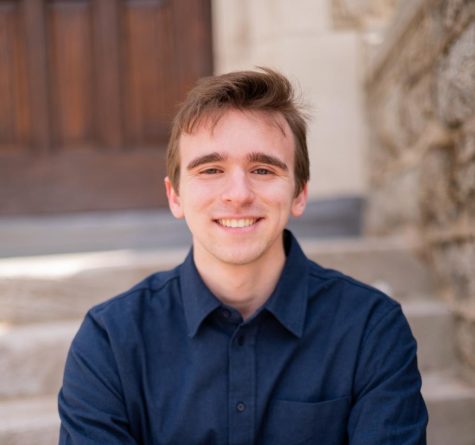Senior Column: Thank You to the Humanities Department
May 3, 2023
I came to Villanova in 2019, and I hated it. Very early on, I toyed with the idea of transferring to another university. I couldn’t help but compare my initial college experience to that of my friends having fun at other “cooler” and less-demanding schools. I endlessly complained about Villanova’s suburban setting, its insularity and, especially, its core requirements. But like a true procrastinator, I did not apply to transfer. In this instance, my indecision worked in my favor.
Soon, everything would be different. Outside of the classroom, I made great friends and dove into student journalism and media production. Inside the classroom, my life would be forever changed by those very same core requirements that I originally saw as a waste of time.
In my first semester at Villanova, when I enrolled in ACS 1000 and saw a syllabus full of Plato’s Republic, Augustine’s Confessions and Aquinas, I thought that I would be falling asleep in class. But I could not have been more wrong.
The most surprising thing about all of college might be how deeply I was impacted by 2,000-year-old texts. As I turned each page, I felt like the authors were talking directly to me, telling me what I needed to hear. Plato, in particular, united morality and knowledge in a way that I had never considered before. Some of the insights I gained from Plato even went beyond the particular subjects discussed.
The manner of speaking in Plato’s dialogues demonstrated a straightforward and earnest search for the truth among friends wherever it may lead, rather than truth being merely a projection of power.
Also, the simple fact that Plato’s writings were so ancient and yet so wise helped dispel the notion that knowledge is just a function of unidirectional technological progress. It made me realize that the past is not to be discarded.
I could go on to describe at length the impact that a large number of texts have had on me over the course of my college education, but it would suffice here to state that what I discovered is a passion for truth.
And this was not truth in a purely empirical sense or in a purely subjective, emotional sense, but it was truth in an all-encompassing, objective and yet elusive sense.
After completing Villanova’s Augustine and Culture Seminar and Theology core requirements, I knew that my foray into these subject areas could not end. I needed a way to keep the part of me ignited by these courses alive, and I found it in Villanova’s best-kept secret: the Humanities Department.
The Humanities Department emphasizes philosophy and theology in its curriculum, but it is primarily in the business of creating good and full human beings. There is no other department quite like it. Its Gateway courses (which are called “God,” “Society,” “World” and “Human Person,” to the confusion of many non-humanities peers) draw upon history, literature, art, politics and more in order to help students discover the meaning of existence and their place in it.
The special ingredient that makes the Humanities Department so spectacular is the people. The professors are passionate not only about their subject areas but about connecting with their students. Their incredible enthusiasm, intelligence, humor, wit and moral character shine through in their teaching. And these qualities don’t go unnoticed. Humanities students are well-aware that they are in the presence of greatness.
It seems that no students on campus are as in love with their area of study as are humanities students. Each humanities student brings a unique personality and experiences to the department. One of the things I will miss most about Villanova is unwinding with my peers in the humanities lounge in SAC 304, where shooting the breeze can turn into a conversation about the tripartite soul in an instant.
In the modern university landscape, the humanities are in decline. Where departments still exist, they are pressured to cater to student desires or brand themselves as useful for the professional world. Both of these strategies make the existence of such departments more viable from a consumer standpoint.
Yet, the Humanities Department is not great because it has an appealing course selection or because it gave me critical thinking skills that are useful for the workforce (even if both of these things are true). It is great because it shaped me as a person. It gave me things that money can not buy: a new outlook on life and a rediscovery of my religious faith.
Of course, I have had stellar and formative experiences outside the Humanities Department. I seized every opportunity to pursue my interests in journalism and film, both inside the classroom in the Communication Department and outside the classroom in The Villanovan and Villanova Television. But even these experiences are put into perspective by the worldview I acquired upon reading humanities texts.
I no longer understand the passions I pursue to be mere tools for my personal advancement or mechanisms for ramping up my dopamine production. I understand them to be an attempt at flourishing — a pursuit toward the divine.
After nearly four years at Villanova, I can say with confidence that I have not merely acquired knowledge, but been shaped as a person by my experiences in humanities.
Not everyone that takes Villanova’s core requirements can (or should) declare a humanities major and take the path I took. Nevertheless, I hope that the University remembers the importance of its core requirements, especially in Philosophy, Theology and ACS, and that future students take them seriously.
Higher education is not simply about career preparation. It is also about the intellectual and moral formation of youth, and nowhere I have ever seen this taken more seriously than in the Humanities Department.



Madison Matella • May 10, 2023 at 7:05 am
Such a great testament to the Humanities and to a true and transformative college experience!